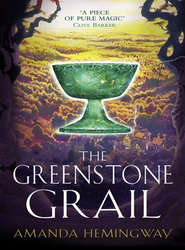По всем вопросам обращайтесь на: info@litportal.ru
(©) 2003-2024.
✖
Witch’s Honour
Автор
Год написания книги
2018
Настройки чтения
Размер шрифта
Высота строк
Поля
Witch’s Honour
Jan Siegel
Witch's Honour concludes the lyrical, richly atmospheric and enthralling tale begun in Prospero's Children and continued in The Dragon-Charmer. Spellbinding in its depiction of places both familiar and strange, of characters both magical and sinister, it is classic English fantasy at its finest.He sat outside the light. Neither moonbeam nor starfire reached his unseen features. All she could see was the hint of a glimmer in narrowed eyes. Perhaps he smiled. 'I knew you would come to me,' he said, 'in the end.'It is New Year's Eve, and the start of the third millennium, and in celebration tonight the ancient house of Wrokeby will host a masked ball. However, among the invited guests in their exotic finery walks one who does not belong. A witch has come to Wrokeby, seeking power, seeking revenge. Her first victim is Dana Walgrim, daughter of the host, who suddenly collapses at the party, dead to the world.Dana is plunged into a mysterious coma, and her brother, Lucas, is losing hope until he learns of a similar case. The patient's name is Fernanda Capel.Suppressing her wild talents, Fern has established a successful career in PR. But the magic of the Gift will not so easily be laid aside, and now she is plagued by a recurring nightmare: of being drawn to the pinnacle of an immense Dark Tower to meet a flame-eyed shadow-figure, and signing an unholy alliance in blood.Lucas tracks Fern down; but when they meet she is convinced that they have met before… Intrigued, Fern decides to help Lucas save his sister. With the aid of her brother, Will, her friend, Gaynor, and the enigmatic Ragginbone, Fern draws upon all her power as a witch to try to bring Dana back.Fern and Lucas soon find themselves in a deadly confrontation with the new occupant of Wrokeby. As the stakes are raised, and losses are sustained on both sides, she discovers that appearances are deceptive, and that not everyone is to be trusted. And perhaps this time, Fern will find herself engaged in a battle she cannot win.
WITCH’S
HONOUR
Jan Siegel
PRAYER (#ud7e47bb6-d49c-5c3e-97a7-99edf63b8e88)
Ah, once I lived my life in every breath,
I gave my first love to a unicorn
and rode the shadows on the edge of death
and pierced my heart with his enchanted horn.
I saw the mountains soar ice-white, cloud-tall,
and moonfoam on an endless waterfall,
and felt the petals of my flesh unfold,
and mountains, waterfalls and heartbeats rolled
down long blue valleys to a distant sea.
Oh Lord, even the pain was dear to me,
if Lord there be.
And now my life is filled with little things,
little moments crowding little days,
my thought has shackles where it once had wings
and narrow vistas overstretch my gaze,
and daily work, and daily growing care
trundle me down the road to God-knows-where
if God is there.
I fear the hour when the world turns grey
and in the hollow midnight try to pray;
mountains and waterfalls have flowed away
leaving leaving me nothing much to say,
nothing but questions, till my thought runs dry—
I ask and ask, but never hear reply:
Is there a dream to set my spirit free?
In all the dead void of eternity
is there a God—and Love—and Phantasy—
or only me?
Is there Another, Lord, or can there be
no God but me?
PROLOGUE (#ud7e47bb6-d49c-5c3e-97a7-99edf63b8e88)
Enter First Witch (#ud7e47bb6-d49c-5c3e-97a7-99edf63b8e88)
The name of the island was Æeea, which, however you attempt to pronounce it, sounds like a scream. It was a gold-green jigsaw fragment of land a long way from any other shore, laced with foam and compassed with the blue-shaded contours of the sea. Near at hand, the gold dulled to yellow: slivers of yellow sand along the coastline, dust-yellow roads, yellow earth and rock showing through the olive groves on the steep climb to the sky. The central crag was tall enough to hook the clouds; in ancient times the natives believed such cloud concealed the more questionable activities of their gods. Nowadays, the former fishermen and peasant-farmers catered to the discerning tourist, telling stories of smugglers and shipwrecks, of mermaids and heroes, and of the famous enchantress who had once lived there in exile, snaring foolish travellers in the silken webs of her hair. Æeea was overlooked by the main holiday companies: only the specialists sent their customers to a location with little night-life and no plate-smashing in the quiet tavernas. Most of the more sumptuous villas were owned by wealthy mainlanders who wanted a bolthole far from the madding crowd of more commercial destinations.
The villa above Hekati Beach was one of these. More modern than most, it had seaward walls of tinted glass, black marble pillars, cubist furniture standing tip-toe on blood-coloured Persian carpets. There was a courtyard, completely enclosed, where orchids jostled for breathing-space in the jungle air and the cold silver notes of falling water made the only music. At its heart the latest incumbent had planted a budding tree, grown from a cutting, a thrusting, eager sapling, whiplash-slender, already putting forth leaves shaped like those of an oak but larger, and veined with a sap that was red. The house was reputedly the property of a shipping owner, a billionaire so reclusive that no one knew his name or had ever seen his face, but he would loan or rent it to friends, colleagues, strangers, unsociable lessees who wanted to bathe on a private beach far from the prying eyes of native peasant or straying tourist. The latest tenant had been there since the spring, cared for by an ancient crone who seemed to the local tradespeople to be wilfully deaf and all but dumb, selecting her purchases with grunts and hearing neither greeting nor question. Her back was hunched and between many wrinkles the slits of her eyes appeared to have no whites, only the beady black gleam of iris and pupil. The few who had glimpsed her mistress declared she was as young as her servant was old, and as beautiful as the hag was ugly, yet she too was aloof even by the standards of the house. They said she did not lie in the sun, fearing perhaps to blemish the pallor of her perfect skin, but swam in the waters of the cove by moonlight, naked but for the dark veil of her hair. In the neighbouring village the men speculated, talking in whispers over the last metaxa of a goddess beyond compare, but the women said she must be disfigured or diseased. She had a pet even stranger than her servant, a huge sphinx-cat hairless as a baby, its skin piebald, greyish-white marked with bruise-black patches. It had been seen hunting on the mountain-slopes above her garden; someone claimed to have watched it kill a snake.
Behind the glass walls of her house, the woman heard the villagers’ stories though her servant never spoke, and smiled to herself, a sweet, secret smile. She still bathed by night, secure in the power of the moon, and by day she stayed in a darkened room, lighting a cold fire on the cold marble hearth, and gazing, gazing into the smoke. Sometimes she sat in the courtyard, where little sun found its way through the vine-trellised canopy. No cicadas strummed here, though the slopes beyond throbbed with their gypsy sawing; no bee buzzed, or not for long. The hungry orchids sucked up all insect-life in their spotted mouths. There was no sound but the water. The woman would sit among the carnivorous plants, dressed in a thin red garment spotted like an orchid, with the black ripples of her hair falling around her shoulders. Watching the tree. The cat came to her there, and rubbed its bald flank against her limbs, purring. Will it fruit, Nehemet? she would murmur. It grows, but will it fruit? And if it does, what fruit will it bear? And she would touch the leaves with her pale fingertips—leaves which trembled at that contact, not after but before, as though in anticipation.
For Panioti, son of the woman who owned the general store and gift shop, there came a night when the last metaxa was a drink too far. He was handsome as only a child of the sun can be, high of cheekbone and brown of skin, with the gloss of youth on him like a velvet down and the idle assurance of absolute beauty. In the summer, he minded the shop for his mother and made love to all the prettiest visitors; in the off-season, he went to college in Athens, took life seriously, and studied to be an engineer. ‘I do not believe in the loveliness of this unknown siren,’ he maintained over the second-to-last drink, ‘or she would not hide herself. A beautiful woman puts on her smallest bikini and shows off her body on the beach. Has anyone seen her?’ But none of them had. ‘There you are. I won’t take her charms on trust; like any rumour, they will have grown in the telling. I want proof. I want to see her with my own eyes, swimming naked in the moonlight. Then I will believe her a goddess.’
‘Why don’t you?’ said one of his companions. ‘Hide in the olive grove, down by the rocks. See for yourself.’
‘He would never dare,’ said another. ‘I bet you five thousand drachma.’
By the last drink, the bet was on.
The cove was inaccessible save by the path down from the house, so the following evening Panioti swam round the headland, coming ashore on the rocks in order to leave no footprints, and concealed himself among the olive trees at the base of the slope. He carried a camera in a waterproof case, the kind that would take pictures in the dark without need of a flash, and a bottle of beer. He sat under the leaves in the fading sunset, leopard-spotted with shadow, drinking the beer slowly, slowly, to make it last. The dark had come down before the bottle was empty and he thrust it upright into the sandy soil. He waited, impatient of the crawling hours, held to his vigil only by the thought of his friends’ scorn, if he were to return too soon. At long last his wristwatch showed the hands drawing towards midnight. Now she will come, he thought, or I shall leave. But I do not think she will come.
She came. He saw her as a white movement on the path, her form apparently wreathed in a glittering mist, her dark hair fading into darkness. She seemed to glide over the uneven ground with a motion that was smooth and altogether silent; he almost fancied her feet did not touch the earth. The hair prickled on his neck. For a moment he could have believed her a pagan spirit, a creature of another kind, whose flesh and substance was not of this world. Then as she descended to the beach he realised the mist-effect was a loose, transparent garment which she unfastened and shed on the sand; her body glowed in the moonlight, slender and shapely as an alabaster nymph, a cold, perfect thing. She raised her arms to the sky as if in greeting to some forgotten deity, then she walked out into the water. The sea was calm and all but waveless: it took her with barely a ripple. He saw her head for a while as a black nodule silhouetted against the sea-glimmer, then it dipped and vanished. Belatedly, he remembered the camera, extracting it from its case, waiting for her to re-emerge. He half wondered if she would show in a photograph or if, like some supernatural being, she would leave no imprint on celluloid. He moved forward, lying along the rocks, poised and ready; but the swimmer did not return. She was gone so long his breath shortened in fear and he put the camera aside, braced to plunge in a search he knew would be hopeless.
She reappeared quite suddenly, within yards of the rocks where he lay. He thought her eyes were wide open, staring through the night with the same dilated gaze with which she must have pierced the darkness undersea. She began to swim towards the shore—towards him—with a sleek invisible stroke. Then abruptly she rose from the water; the sea streamed from her limbs; her black hair clung wetly to breasts, shoulders, back. For the first time, he saw her face, dim in the moonglow but not dim enough—he looked into eyes deep as the abyss and bright with a lustre that was not of the moon, he saw the lips parted as if in hunger…He tried to move, to flee, forgetful of the camera, of the bet, of his manly pride; but his legs were rooted. The whisper of her voice seemed to reach into his soul.
‘Do I look fair to you, peasant?’ She swept back her hair, thrusting her breasts towards him, pale hemispheres surmounted with nipples that jutted like thorns. ‘Look your fill. Tell me, did you feel bold coming here? Did you feel daring, sneaking among the rocks to gawp, and ogle, and boast to your friends? What will you say to them, when you return—if you return? That you have seen Venus Infernalis, Aphrodite risen from a watery grave, reborn from the spume of the sea-god’s ecstasy? What will you say?’
Closer she came and closer; his spirit recoiled, but his muscles were locked and his body shuddered.
Jan Siegel
Witch's Honour concludes the lyrical, richly atmospheric and enthralling tale begun in Prospero's Children and continued in The Dragon-Charmer. Spellbinding in its depiction of places both familiar and strange, of characters both magical and sinister, it is classic English fantasy at its finest.He sat outside the light. Neither moonbeam nor starfire reached his unseen features. All she could see was the hint of a glimmer in narrowed eyes. Perhaps he smiled. 'I knew you would come to me,' he said, 'in the end.'It is New Year's Eve, and the start of the third millennium, and in celebration tonight the ancient house of Wrokeby will host a masked ball. However, among the invited guests in their exotic finery walks one who does not belong. A witch has come to Wrokeby, seeking power, seeking revenge. Her first victim is Dana Walgrim, daughter of the host, who suddenly collapses at the party, dead to the world.Dana is plunged into a mysterious coma, and her brother, Lucas, is losing hope until he learns of a similar case. The patient's name is Fernanda Capel.Suppressing her wild talents, Fern has established a successful career in PR. But the magic of the Gift will not so easily be laid aside, and now she is plagued by a recurring nightmare: of being drawn to the pinnacle of an immense Dark Tower to meet a flame-eyed shadow-figure, and signing an unholy alliance in blood.Lucas tracks Fern down; but when they meet she is convinced that they have met before… Intrigued, Fern decides to help Lucas save his sister. With the aid of her brother, Will, her friend, Gaynor, and the enigmatic Ragginbone, Fern draws upon all her power as a witch to try to bring Dana back.Fern and Lucas soon find themselves in a deadly confrontation with the new occupant of Wrokeby. As the stakes are raised, and losses are sustained on both sides, she discovers that appearances are deceptive, and that not everyone is to be trusted. And perhaps this time, Fern will find herself engaged in a battle she cannot win.
WITCH’S
HONOUR
Jan Siegel
PRAYER (#ud7e47bb6-d49c-5c3e-97a7-99edf63b8e88)
Ah, once I lived my life in every breath,
I gave my first love to a unicorn
and rode the shadows on the edge of death
and pierced my heart with his enchanted horn.
I saw the mountains soar ice-white, cloud-tall,
and moonfoam on an endless waterfall,
and felt the petals of my flesh unfold,
and mountains, waterfalls and heartbeats rolled
down long blue valleys to a distant sea.
Oh Lord, even the pain was dear to me,
if Lord there be.
And now my life is filled with little things,
little moments crowding little days,
my thought has shackles where it once had wings
and narrow vistas overstretch my gaze,
and daily work, and daily growing care
trundle me down the road to God-knows-where
if God is there.
I fear the hour when the world turns grey
and in the hollow midnight try to pray;
mountains and waterfalls have flowed away
leaving leaving me nothing much to say,
nothing but questions, till my thought runs dry—
I ask and ask, but never hear reply:
Is there a dream to set my spirit free?
In all the dead void of eternity
is there a God—and Love—and Phantasy—
or only me?
Is there Another, Lord, or can there be
no God but me?
PROLOGUE (#ud7e47bb6-d49c-5c3e-97a7-99edf63b8e88)
Enter First Witch (#ud7e47bb6-d49c-5c3e-97a7-99edf63b8e88)
The name of the island was Æeea, which, however you attempt to pronounce it, sounds like a scream. It was a gold-green jigsaw fragment of land a long way from any other shore, laced with foam and compassed with the blue-shaded contours of the sea. Near at hand, the gold dulled to yellow: slivers of yellow sand along the coastline, dust-yellow roads, yellow earth and rock showing through the olive groves on the steep climb to the sky. The central crag was tall enough to hook the clouds; in ancient times the natives believed such cloud concealed the more questionable activities of their gods. Nowadays, the former fishermen and peasant-farmers catered to the discerning tourist, telling stories of smugglers and shipwrecks, of mermaids and heroes, and of the famous enchantress who had once lived there in exile, snaring foolish travellers in the silken webs of her hair. Æeea was overlooked by the main holiday companies: only the specialists sent their customers to a location with little night-life and no plate-smashing in the quiet tavernas. Most of the more sumptuous villas were owned by wealthy mainlanders who wanted a bolthole far from the madding crowd of more commercial destinations.
The villa above Hekati Beach was one of these. More modern than most, it had seaward walls of tinted glass, black marble pillars, cubist furniture standing tip-toe on blood-coloured Persian carpets. There was a courtyard, completely enclosed, where orchids jostled for breathing-space in the jungle air and the cold silver notes of falling water made the only music. At its heart the latest incumbent had planted a budding tree, grown from a cutting, a thrusting, eager sapling, whiplash-slender, already putting forth leaves shaped like those of an oak but larger, and veined with a sap that was red. The house was reputedly the property of a shipping owner, a billionaire so reclusive that no one knew his name or had ever seen his face, but he would loan or rent it to friends, colleagues, strangers, unsociable lessees who wanted to bathe on a private beach far from the prying eyes of native peasant or straying tourist. The latest tenant had been there since the spring, cared for by an ancient crone who seemed to the local tradespeople to be wilfully deaf and all but dumb, selecting her purchases with grunts and hearing neither greeting nor question. Her back was hunched and between many wrinkles the slits of her eyes appeared to have no whites, only the beady black gleam of iris and pupil. The few who had glimpsed her mistress declared she was as young as her servant was old, and as beautiful as the hag was ugly, yet she too was aloof even by the standards of the house. They said she did not lie in the sun, fearing perhaps to blemish the pallor of her perfect skin, but swam in the waters of the cove by moonlight, naked but for the dark veil of her hair. In the neighbouring village the men speculated, talking in whispers over the last metaxa of a goddess beyond compare, but the women said she must be disfigured or diseased. She had a pet even stranger than her servant, a huge sphinx-cat hairless as a baby, its skin piebald, greyish-white marked with bruise-black patches. It had been seen hunting on the mountain-slopes above her garden; someone claimed to have watched it kill a snake.
Behind the glass walls of her house, the woman heard the villagers’ stories though her servant never spoke, and smiled to herself, a sweet, secret smile. She still bathed by night, secure in the power of the moon, and by day she stayed in a darkened room, lighting a cold fire on the cold marble hearth, and gazing, gazing into the smoke. Sometimes she sat in the courtyard, where little sun found its way through the vine-trellised canopy. No cicadas strummed here, though the slopes beyond throbbed with their gypsy sawing; no bee buzzed, or not for long. The hungry orchids sucked up all insect-life in their spotted mouths. There was no sound but the water. The woman would sit among the carnivorous plants, dressed in a thin red garment spotted like an orchid, with the black ripples of her hair falling around her shoulders. Watching the tree. The cat came to her there, and rubbed its bald flank against her limbs, purring. Will it fruit, Nehemet? she would murmur. It grows, but will it fruit? And if it does, what fruit will it bear? And she would touch the leaves with her pale fingertips—leaves which trembled at that contact, not after but before, as though in anticipation.
For Panioti, son of the woman who owned the general store and gift shop, there came a night when the last metaxa was a drink too far. He was handsome as only a child of the sun can be, high of cheekbone and brown of skin, with the gloss of youth on him like a velvet down and the idle assurance of absolute beauty. In the summer, he minded the shop for his mother and made love to all the prettiest visitors; in the off-season, he went to college in Athens, took life seriously, and studied to be an engineer. ‘I do not believe in the loveliness of this unknown siren,’ he maintained over the second-to-last drink, ‘or she would not hide herself. A beautiful woman puts on her smallest bikini and shows off her body on the beach. Has anyone seen her?’ But none of them had. ‘There you are. I won’t take her charms on trust; like any rumour, they will have grown in the telling. I want proof. I want to see her with my own eyes, swimming naked in the moonlight. Then I will believe her a goddess.’
‘Why don’t you?’ said one of his companions. ‘Hide in the olive grove, down by the rocks. See for yourself.’
‘He would never dare,’ said another. ‘I bet you five thousand drachma.’
By the last drink, the bet was on.
The cove was inaccessible save by the path down from the house, so the following evening Panioti swam round the headland, coming ashore on the rocks in order to leave no footprints, and concealed himself among the olive trees at the base of the slope. He carried a camera in a waterproof case, the kind that would take pictures in the dark without need of a flash, and a bottle of beer. He sat under the leaves in the fading sunset, leopard-spotted with shadow, drinking the beer slowly, slowly, to make it last. The dark had come down before the bottle was empty and he thrust it upright into the sandy soil. He waited, impatient of the crawling hours, held to his vigil only by the thought of his friends’ scorn, if he were to return too soon. At long last his wristwatch showed the hands drawing towards midnight. Now she will come, he thought, or I shall leave. But I do not think she will come.
She came. He saw her as a white movement on the path, her form apparently wreathed in a glittering mist, her dark hair fading into darkness. She seemed to glide over the uneven ground with a motion that was smooth and altogether silent; he almost fancied her feet did not touch the earth. The hair prickled on his neck. For a moment he could have believed her a pagan spirit, a creature of another kind, whose flesh and substance was not of this world. Then as she descended to the beach he realised the mist-effect was a loose, transparent garment which she unfastened and shed on the sand; her body glowed in the moonlight, slender and shapely as an alabaster nymph, a cold, perfect thing. She raised her arms to the sky as if in greeting to some forgotten deity, then she walked out into the water. The sea was calm and all but waveless: it took her with barely a ripple. He saw her head for a while as a black nodule silhouetted against the sea-glimmer, then it dipped and vanished. Belatedly, he remembered the camera, extracting it from its case, waiting for her to re-emerge. He half wondered if she would show in a photograph or if, like some supernatural being, she would leave no imprint on celluloid. He moved forward, lying along the rocks, poised and ready; but the swimmer did not return. She was gone so long his breath shortened in fear and he put the camera aside, braced to plunge in a search he knew would be hopeless.
She reappeared quite suddenly, within yards of the rocks where he lay. He thought her eyes were wide open, staring through the night with the same dilated gaze with which she must have pierced the darkness undersea. She began to swim towards the shore—towards him—with a sleek invisible stroke. Then abruptly she rose from the water; the sea streamed from her limbs; her black hair clung wetly to breasts, shoulders, back. For the first time, he saw her face, dim in the moonglow but not dim enough—he looked into eyes deep as the abyss and bright with a lustre that was not of the moon, he saw the lips parted as if in hunger…He tried to move, to flee, forgetful of the camera, of the bet, of his manly pride; but his legs were rooted. The whisper of her voice seemed to reach into his soul.
‘Do I look fair to you, peasant?’ She swept back her hair, thrusting her breasts towards him, pale hemispheres surmounted with nipples that jutted like thorns. ‘Look your fill. Tell me, did you feel bold coming here? Did you feel daring, sneaking among the rocks to gawp, and ogle, and boast to your friends? What will you say to them, when you return—if you return? That you have seen Venus Infernalis, Aphrodite risen from a watery grave, reborn from the spume of the sea-god’s ecstasy? What will you say?’
Closer she came and closer; his spirit recoiled, but his muscles were locked and his body shuddered.










